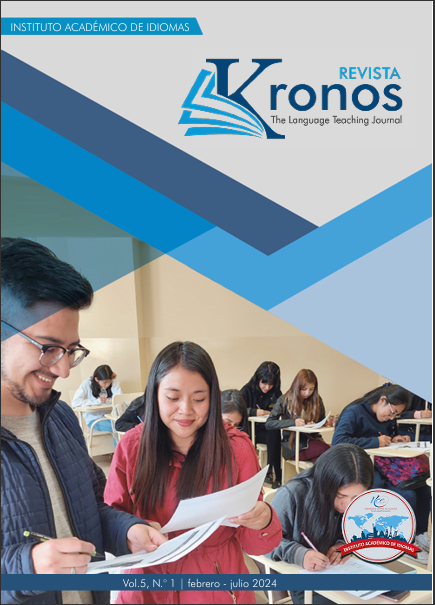Principles of Andragogy and English Language Teaching in Ecuadorian Higher Education
DOI:
https://doi.org/10.29166/kronos.v5i1.5854Keywords:
Principles of Andragogy, English language teaching, English language learning, Mixed MethodsAbstract
English language proficiency in Ecuadorian higher education is related to the efficient use of technological tools and equipment, self-instruction, access to information, and social interaction for the personal, academic, or profes sional purposes of learners. The objective of the present study was to explain the influence of the Andragogy Principles application on proficiency in the English language. The research was carried out under the pragmatic paradigm, mixed methods design, quantitative-qualitative approach, and descriptive-explanatory scope in language centers of third-lev el educational institutions of the Higher Education System in Ecuador. The participants included were legally enrolled students and legally hired teachers. The research was divided into two stages: First, during the quantitative stage, the online questionnaire PALS consisting of 40 items was applied to determine if the principles of andragogy were known and used; in addition, the online SET test was aimed to establish the English language proficiency of participants. The most outstanding results were: a teacher-centered model and low to very low levels of English language proficiency of the students. Second, in the qualitative stage, teachers were con-vened in several discussion groups, along which it was evident that the social actors (teachers) showed limited knowledge regarding the fundamentals of teaching and learning processes, Principles of Andragogy, students’ characteristics, and teaching methods and strategies. After the triangulation, it was concluded that teachers did not apply the princi-ples of andragogy, which could be considered an outstanding factor for the level present-ed by the participants; in addition, it was established that the characteristics of the students were not considered but a workbook as the base when planning syllabi or lessons, and it reinforce the concept a teach er-centered model limiting the student high-level proficiency.
Downloads
References
Arias, F. (2006). El proyecto de investigación. Episteme.
Callejo, J. (2001). El grupo de discusión: introducción a una práctica de investigación. Ariel Practicum. DOI: https://doi.org/10.1558/sols.v3i1.91
CES. (27 de julio de 2022). Reglamento de Régimen Académico. Obtenido de RPC-SE-08-No.023-2022: https://www.ces.gob.ec/wp-content/uploads/2022/08/Reglamento-de-Re%CC%81gimen-Acade%CC%81mico-vigente-a-partir-del-16-de-septiembre-de-2022.pdf
Consejo de Europa. (2020). Marco común europeo de referencia para las lenguas: aprendizaje, enseñanza, evaluación. Servicio de publicaciones del Consejo de Europa. Estrasburgo.
Conti, G. (1998). Escala de los Principios del Aprendizaje Adulto (PALS) . Obtenido de http://www.conti-creations.com/PALS_Spanish.pdf
Del Pino, R., & Martínez, J. (2022). Manual para elaboración y defensa del trabajo de grado en ciencias de la salud. Elsevier.
EF SET. (8 de marzo de 2021). EF SET. Obtenido de https://www.efset.org/es/ef-set-50/
EF SET. (2022). Exámenes de inglés. Obtenido de https://www.ef.com/wwes/certificados-ingles/efset/
EF, English Profiency Index. (2023). El ranking mundial más grande según su dominio del inglés. Obtenido de https://www.ef.com.ec/epi/
Knowles, M. (2007). Andragogía; el aprendizaje de adultos. Oxford University Press.
López, A. (2013). oea.uprrp.ed. Obtenido de La entrevista y los grupos focales: https://cea.uprrp.edu/wp-content/uploads/2013/05/grupo_focal.pdf
Northrup, D. (2013). How English became the global language. DOI: https://doi.org/10.1057/9781137303073
Petrosyan, A. (2023). https://www.statista.com/. Obtenido de Common languages used for web content 2023, by share of websites: https://www.statista.com/statistics/262946/most-common-languages-on-the-internet/#:~:text=As%20of%20January%202023%2C%20English,language%20followed%2C%20with%204.3%20percent.
STATISTA. (24 d
Published
How to Cite
Issue
Section
License
Copyright (c) 2024 ANABEL PORTERO LOPEZ

This work is licensed under a Creative Commons Attribution-NonCommercial-ShareAlike 4.0 International License.












